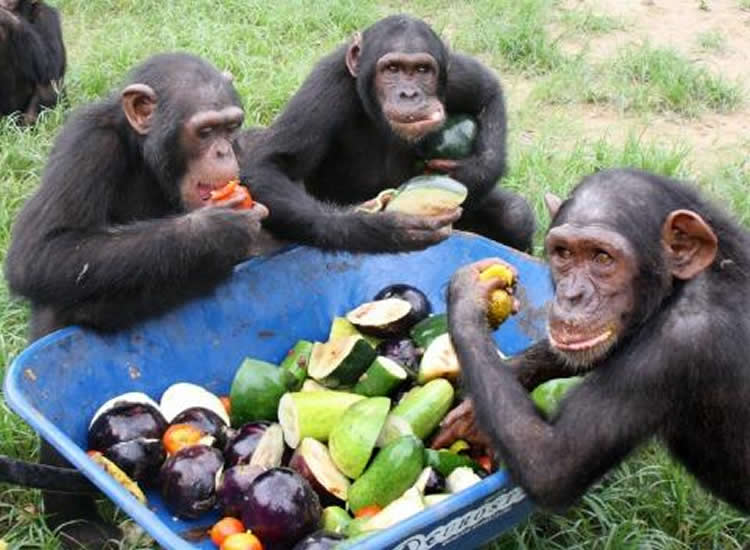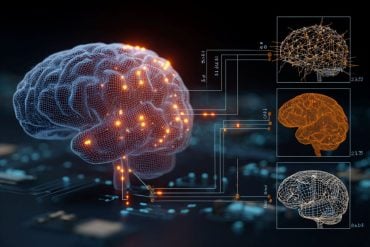Summary: According to researchers, chimpanzees make prosocial choices more rapidly than making choices that only benefit themselves.
Source: University of Michigan.
When it comes to cooperation, there’s no monkey business in how some chimpanzees respond.
These primates often make decisions faster that benefits others than themselves, according to a newly published University of Michigan study.
For decades, social scientists and biologists have sought to study primates because they are humans’ closest living relatives. Chimpanzees can also be very cooperative in the wild–forming alliances with friends or hunting together in groups.
“Chimpanzees are an important comparative model for human cooperation,” said Alexandra Rosati, U-M assistant professor of psychology and anthropology.
Rosati, the study’s lead author, and colleagues at Harvard University examined how chimpanzees from the Republic of Congo think about cooperative decisions and the response time in situations involving prosocial behavior, which involves how one’s actions benefit others, such as giving time, effort or resources.
The 40 chimpanzees completed tasks that assessed cooperation and self-control, including:
Donation task: The chimpanzee could provide food to both himself and a partner at no cost, or choose to only get food for himself. Chimpanzees were more likely to pick the prosocial option if they made a fast choice–as though their gut reaction was to cooperate with the partner. If they took longer to decide, however, they were more likely to keep the food for themselves.

Helping task: The chimpanzee could give a partner an object that was out of reach. Individual chimpanzees that were more likely to lend a hand were also the fastest to respond to their partner’s problem. In general, this supports situations in which cooperative individuals tend to make prosocial choices faster than selfish people.
Punishment task: The chimpanzee could stop a thief from taking a stolen resource by collapsing a table so the thief couldn’t get food. Like in the helping study, the chimpanzees who were most reactive to unfairness tended to collapse the table more quickly.
Thus, in both reward and punishment contexts, the chimpanzees made prosocial choices more rapidly than those benefiting themselves.
“Ultimately, our results show that chimpanzee cooperation involves several cognitive mechanisms that parallel those seen in humans,” the researchers wrote.
Source: Jared Wadley – University of Michigan
Publisher: Organized by NeuroscienceNews.com.
Image Source: NeuroscienceNews.com image is credited to Jane Goodall Institute / By Fernando Turmo.
Original Research: Abstract for “Chimpanzee Cooperation Is Fast and Independent From Self-Control” by Alexandra G. Rosati, Lauren M. DiNicola, and Joshua W. Buckholtz, in Psychological Science. Published October 8 2018.
doi:10.1177/0956797618800042
[cbtabs][cbtab title=”MLA”]University of Michigan”Chimpanzees React Faster to Cooperate than Make Selfish Choices.” NeuroscienceNews. NeuroscienceNews, 29 October 2018.
<https://neurosciencenews.com/chimp-cooperation-10113/>.[/cbtab][cbtab title=”APA”]University of Michigan(2018, October 29). Chimpanzees React Faster to Cooperate than Make Selfish Choices. NeuroscienceNews. Retrieved October 29, 2018 from https://neurosciencenews.com/chimp-cooperation-10113/[/cbtab][cbtab title=”Chicago”]University of Michigan”Chimpanzees React Faster to Cooperate than Make Selfish Choices.” https://neurosciencenews.com/chimp-cooperation-10113/ (accessed October 29, 2018).[/cbtab][/cbtabs]
Abstract
Chimpanzee Cooperation Is Fast and Independent From Self-Control
Large-scale cooperation is a hallmark of our species and appears to be unique among primates. Yet the evolutionary mechanisms that drove the emergence of humanlike patterns of cooperation remain unclear. Studying the cognitive processes underlying cooperative behavior in apes, our closest living relatives, can help identify these mechanisms. Accordingly, we employed a novel test battery to assess the willingness of 40 chimpanzees to donate resources, instrumentally help others, and punish a culpable thief. We found that chimpanzees were faster to make prosocial than selfish choices and that more prosocial individuals made the fastest responses. Further, two measures of self-control did not predict variation in prosocial responding, and individual performance across cooperative tasks did not covary. These results show that chimpanzees and humans share key cognitive processes for cooperation, despite differences in the scope of their cooperative behaviors.






